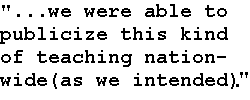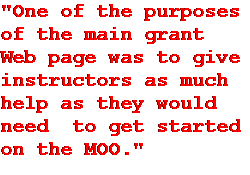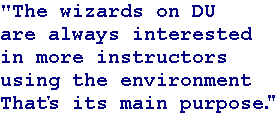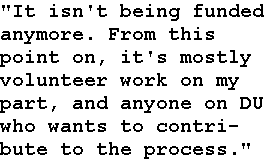
COMPOSITION IN CYBERSPACE
The Project:
Funded by the Annenberg/CPB
foundation, the Composition in Cyberspace project is studying and promoting the use of
MOOs and listservs in the teaching of composition. The project's site gives details of MOO and
listserv use in composition pedagogies, sample syllabi, familiarization commands for MOOs,
listserv instructions, and reports on the uses of these tools.
What's It All About?
As seemed only appropriate with this sort of project, I interviewed Leslie Harris, the project's Director, in Diversity University's MOO.
Although I couldn't change my name in DU's MOO to something more suitable, I was pleased to
find my assigned name was "Tourmaline_guest." It was nice to know that I was a
valued gem here. Leslie certainly regarded me as one. Anyway, here's what I learned from him:
The project began in early 1995 with the Annenberg/CPB grant. The grant allowed the project to
research the uses of MOO in education, teach several classes in DU's MOO, give several
conferences and workshops for educators on using MOOs for composition teaching, and allowed
Diversity University to expand their hardware, giving greater flexibility and speed to the DU
MOO.
 Diversity University was the host of the Project, and its MOO was the project's
prototype. Primary project players included Leslie Harris (Plattsburg), Rob Smith (then at George
Washington Univ), and Terry Craig (West Virginia Northern Community College). The project
taught paired sessions of composition with Smith and Craig, hosted two face to face conferences
involving faculty training, funded various programmers on DU's MOO, resulting in an improved
MOO environment, and disseminated MOO teaching methodology to instructors
nationwide.
Diversity University was the host of the Project, and its MOO was the project's
prototype. Primary project players included Leslie Harris (Plattsburg), Rob Smith (then at George
Washington Univ), and Terry Craig (West Virginia Northern Community College). The project
taught paired sessions of composition with Smith and Craig, hosted two face to face conferences
involving faculty training, funded various programmers on DU's MOO, resulting in an improved
MOO environment, and disseminated MOO teaching methodology to instructors
nationwide.
 One of the primary manifestations of the
project's work was the Composition in Cyberspace web site on MOO technology and using DU
MOO. These pages are a wealth of information on using and programming DU's MOO. Since
most MOOs have similar command structures, this repository of information can be applied to
nearly any MOO. The MOO pages give details on connecting, establishing a character,
interacting, and building in the MOO environment. They also give tips on methods of teaching in
the MOO, what instructors need to watch for with their students, and what instructors can hope
to achieve with MOO sessions in their classrooms.
One of the primary manifestations of the
project's work was the Composition in Cyberspace web site on MOO technology and using DU
MOO. These pages are a wealth of information on using and programming DU's MOO. Since
most MOOs have similar command structures, this repository of information can be applied to
nearly any MOO. The MOO pages give details on connecting, establishing a character,
interacting, and building in the MOO environment. They also give tips on methods of teaching in
the MOO, what instructors need to watch for with their students, and what instructors can hope
to achieve with MOO sessions in their classrooms.
 Instructors should note that Diversity University, as with most MOOs, wishes them
to get permission before bringing a class into the MOO. This is a relatively painless process.
Leslie explains that on DU's MOO, "First, you need to become a regular character, learn the
environment, and so on. Then you need to get in touch with one of the wizards and say that you
want to bring a class to DU. Once you've been given the proper permissions, you can build your
own classroom, register your students, and start teaching on-line."
Instructors should note that Diversity University, as with most MOOs, wishes them
to get permission before bringing a class into the MOO. This is a relatively painless process.
Leslie explains that on DU's MOO, "First, you need to become a regular character, learn the
environment, and so on. Then you need to get in touch with one of the wizards and say that you
want to bring a class to DU. Once you've been given the proper permissions, you can build your
own classroom, register your students, and start teaching on-line."
Another extremely valuable component of the project's web pages is the Composition Course
Database, a listing of instructors using the Internet in their teaching, and a way to facilitate
the pairing of classes and the sharing of information. Leslie is especially keen that instructors
frequently visit the database, and help to keep it maintained and current. He notes that, " it
will only be useful if it remains current."
What's Going On With It Now?
 The Annenberg/CPB grant ran out for the
Composition in Cyberspace project in August 1996. Essentially, the project is over. Although
Leslie plans to continue writing grants to support the teacher-education aspects of the project, it
is unlikely that the project will be able to hold more workshops or seminars.
The Annenberg/CPB grant ran out for the
Composition in Cyberspace project in August 1996. Essentially, the project is over. Although
Leslie plans to continue writing grants to support the teacher-education aspects of the project, it
is unlikely that the project will be able to hold more workshops or seminars.
Leslie assured me that the project's web pages would remain on-line, and that he would continue
to update them. He wants the pages to continue to be an up-to-date resource for instructors. He is
particularly concerned that the Composition Course Database remain current. "I especially want
people to continue to visit [the database] and update their records, list their classes, search for
colleagues, and so on."
As a final note, Leslie plans to apply for additional teacher-training grants, and to pursue
additional projects similar to the Composition in Cyberspace project. He feels that as Internet use
in teaching becomes more widespread, there will be a continuing need for technology training.
Back
Click a link to see a description of the project:
| Project Gutenberg | Epiphany | Composition in Cyberspace | Crossroads
|
| Hyperfiction Narrative Workshop | Netoric | Jesters |
Click to Visit a Site:
| Project Gutenberg | Epiphany | Composition in
Cyberspace | Crossroads |
| Annenberg/CPB | Hyperfiction
Narrative Workshop |
Netoric | Jesters |
Direct comments to Scott Kapel


 Diversity University was the host of the Project, and its MOO was the project's
prototype. Primary project players included Leslie Harris (Plattsburg), Rob Smith (then at George
Washington Univ), and Terry Craig (West Virginia Northern Community College). The project
taught paired sessions of composition with Smith and Craig, hosted two face to face conferences
involving faculty training, funded various programmers on DU's MOO, resulting in an improved
MOO environment, and disseminated MOO teaching methodology to instructors
nationwide.
Diversity University was the host of the Project, and its MOO was the project's
prototype. Primary project players included Leslie Harris (Plattsburg), Rob Smith (then at George
Washington Univ), and Terry Craig (West Virginia Northern Community College). The project
taught paired sessions of composition with Smith and Craig, hosted two face to face conferences
involving faculty training, funded various programmers on DU's MOO, resulting in an improved
MOO environment, and disseminated MOO teaching methodology to instructors
nationwide. One of the primary manifestations of the
project's work was the Composition in Cyberspace web site on MOO technology and using DU
MOO. These pages are a wealth of information on using and programming DU's MOO. Since
most MOOs have similar command structures, this repository of information can be applied to
nearly any MOO. The MOO pages give details on connecting, establishing a character,
interacting, and building in the MOO environment. They also give tips on methods of teaching in
the MOO, what instructors need to watch for with their students, and what instructors can hope
to achieve with MOO sessions in their classrooms.
One of the primary manifestations of the
project's work was the Composition in Cyberspace web site on MOO technology and using DU
MOO. These pages are a wealth of information on using and programming DU's MOO. Since
most MOOs have similar command structures, this repository of information can be applied to
nearly any MOO. The MOO pages give details on connecting, establishing a character,
interacting, and building in the MOO environment. They also give tips on methods of teaching in
the MOO, what instructors need to watch for with their students, and what instructors can hope
to achieve with MOO sessions in their classrooms. Instructors should note that Diversity University, as with most MOOs, wishes them
to get permission before bringing a class into the MOO. This is a relatively painless process.
Leslie explains that on DU's MOO, "First, you need to become a regular character, learn the
environment, and so on. Then you need to get in touch with one of the wizards and say that you
want to bring a class to DU. Once you've been given the proper permissions, you can build your
own classroom, register your students, and start teaching on-line."
Instructors should note that Diversity University, as with most MOOs, wishes them
to get permission before bringing a class into the MOO. This is a relatively painless process.
Leslie explains that on DU's MOO, "First, you need to become a regular character, learn the
environment, and so on. Then you need to get in touch with one of the wizards and say that you
want to bring a class to DU. Once you've been given the proper permissions, you can build your
own classroom, register your students, and start teaching on-line." The Annenberg/CPB grant ran out for the
Composition in Cyberspace project in August 1996. Essentially, the project is over. Although
Leslie plans to continue writing grants to support the teacher-education aspects of the project, it
is unlikely that the project will be able to hold more workshops or seminars.
The Annenberg/CPB grant ran out for the
Composition in Cyberspace project in August 1996. Essentially, the project is over. Although
Leslie plans to continue writing grants to support the teacher-education aspects of the project, it
is unlikely that the project will be able to hold more workshops or seminars.